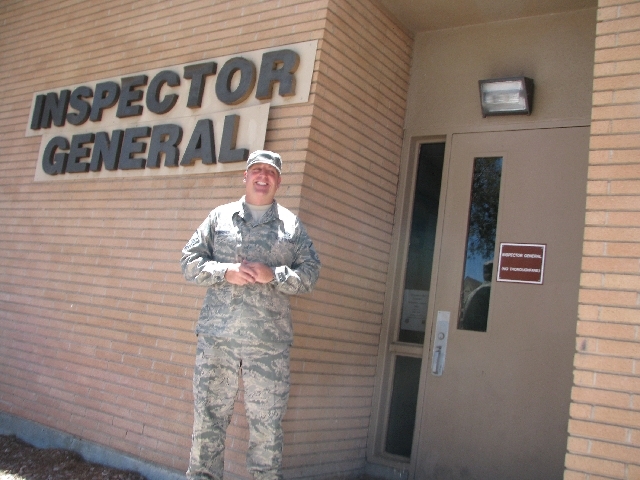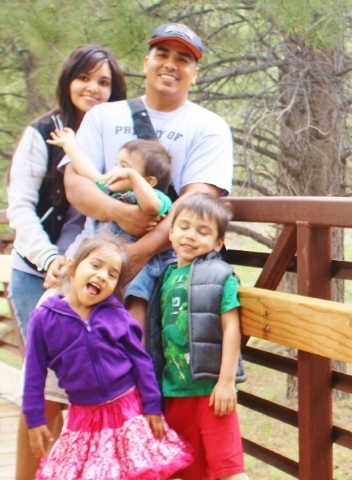Summerlin servicemen provide a glimpse into military life


They put their lives on the line for their country. In honor of the Fourth of July, View looks at what it’s like to be in the military and how it affects one’s life.
These two soldiers live in Summerlin. They were still on active duty and asked to be identified as Mr. Smith, 36, and Mr. Jones, 38.
Jones said some people signed on because they truly feel the need to serve. He’d just turned 19 when he enlisted.
“I was a recruiter’s dream,” he said. “I walked in and said, ‘All I want to do is jump out of planes and learn how to shoot people.’ ”
First came basic training. It’s not as bad as they make it seem in the movies, he said.
“It’s meant to break you down and then rebuild the person with Army values,” Jones said.
MILITARY MOVES MAKE FAMILY LIFE
A CHALLENGE
Jones’ first assignment was a plush one: a balmy island in the Pacific. Most of his platoon was sent to Fort Riley in Kansas.
“It’s a big lifestyle change. … It’s apples and oranges,” Jones said of military and civilian life. “It’s difficult when you first join up. It’s very structured. … you’re told where to be, what time to be there, and you’d better not be late. If you are, there will be serious repercussions.”
Active-duty personnel can expect to move around a lot. It’s called a “permanent change of station,” but it’s not so permanent. They move about every three years.
They can request an area, but the ultimate decider is the military’s needs. Even if there is a major conflict overseas, personnel can find themselves shuttled around stateside.
Smith joined at 21 and was stationed as an infantryman near the Canadian border. He said he expected to be sent to the Middle East after 9/11. Instead, he was sent to Seattle. Still, he knew he could be called up at any time.
“You’re a soldier 24/7 … you’re ready to go anywhere in the world in 24 hours,” Smith said.
Jones was wed just before he was shipped overseas. First he was sent to Bosnia, then to Haiti.
“When I got married, I left pretty much for three months,” Jones said. “I came back, was there for three months, then I left for a year.”
Smith said it’s good and bad for families.
“If you’re married, you get housing,” Smith said. “You can live on post (on base) or get an allowance for housing. So, most people, when they’re brand new, will live on post so they don’t have to pay rent or utilities. … That’s good, but it’s also bad when the husband or wife in the military gets sent away. Then the one that’s left at home is definitely doing double duty. They’re being the mom and the dad.”
Jones has moved 16 times in the 20 years since he joined the Army. He and his wife always made sure their children had avenues to stay busy and to make new friends.
“It’s tough on kids,” Jones said. “It’s a matter of parenting. You have to get them involved in programs, get them involved in athletics. … I’ve seen some great kids. I’ve seen messed-up kids. I think it depends on the individual. At the same time, they get to see the world. What I’ve done and what I’ve seen, most people could only dream of. But I’ve done it all. I’ve done more than some people will ever do, ever, in their entire life.”
NATIONAL GUARD OFFERS ALTERNATIVE WAY
TO SERVE
Che Ruiz Rios, 34, of The Lakes, is also in the military. Since 2007, he’s been a recruiter for the National Guard and is often out in public meeting people. He said the National Guard gives one the opportunity to support his country without giving up his career.
All his deployments have been stateside. His longest was for 1½ years when he was stationed at Fort Irwin near Barstow, Calif. He helped run the base for the unit that was sent overseas.
“Not being deployed, after being in it for 11 years, you’re either considered unlucky or very lucky,” he said.
So, which does he consider himself to be?
“I’m blessed, very blessed,” he said.
What does he like most about the National Guard?
“It’s very detail-oriented, everything, down to the smallest task is (afforded) a great level of importance,” Rios said. “So, even if it’s one single piece of paper, everything has to be exact and presented in a neat and orderly fashion. A lot of careers, other jobs I’ve had, there’s not that attention to every aspect, like, of your personal life — the personal behavior, the level of fitness, the quality of work that you submit. It’s not the same as in the civilian world.”
The only thing he said he doesn’t like about the National Guard is the regulation haircut.
He said someone looking to join the military needs to be goal-oriented and motivated, able to think on his feet and able to function as a team member. Rios said that, looking back, he’s accomplished more than he ever could have imagined and can hold his head high.
He said the general public doesn’t understand that “we’re just normal people, just like anybody else. We’re just cut from a different cloth.”
MANY EXPENSES COVERED, DISCOUNTS OFFERED FOR THOSE IN SERVICE
Smith said when he visits his hometown, he is always welcomed as a hero for his service.
“People are always asking where I’ve been, what I’ve done,” he said.
When military personnel are sent to a new permanent change of station, they usually receive a couple of months’ notice. The move costs them nothing, as professional movers come in and pack up the house. Even the family dog is transported at the military’s expense.
Likewise, medical coverage is totally covered for military personnel. Their immediate family gets reduced rates.
“Our cost of insurance is a lot cheaper, but it’s a little more restricted, too,” Smith said. “Like, I have to go to a military doctor, but I don’t pay anything. Any prescriptions, I don’t pay anything.”
His children have co-payments, he said, but “they max out at $1,000 per year, even if something catastrophic happens, like, I had my son. He got injured, and I had $100,000 worth of medical bills, and I only paid $1,000.”
Servicemen and women get to fly on military flights at rates that civilians can only imagine, such as $15 to fly to Europe. It is, however, on a space-available basis.
A Base Exchange offers shopping for high-quality items, such as flat-screen TVs at deep discounts. Items purchased there are tax-exempt. There is also a commissary for buying groceries.
The biggest difference between being a civilian and being in the military is financial, Jones said.
“A civilian in my kind of job probably makes two times the money I do,” Jones said. “But I didn’t join the military to be rich, and I’ll be young enough once I retire to find another career.”
Entry-level pay qualifies families for welfare programs, they said. After a few years, as one progresses up the ladder, the pay increases.
“We put in a lot of time, but it’s nothing I’d complain about,” Smith said. “We live comfortably, relatively.”
DEALING WITH LOSS A PART OF THE JOB, SOLDIER SAYS
Military personnel face stressful situations and also deal with loss, a topic harder to broach.
“When I was in Iraq,” said Smith, “I lost three in my platoon. A platoon has 28 to 32 people. One of my soldiers, I’ve got his name tattooed on my shoulder. It happened right in front of me. And two of them died in that event, and I had an insurgent get into our chow hall and blow himself up.”
That was in Mosul in December 2004, a story that made headlines worldwide.
“We lost 22 people, over 80 injuries … The loss was terrible,” he said. “I’ve never cried so hard in my life. We understand that when we join up, just like a policeman or a firefighter. We understand that comes along with our jobs.”
Contact Summerlin/Summerlin South View reporter Jan Hogan at jhogan@viewnews.com or 702-387-2949.












